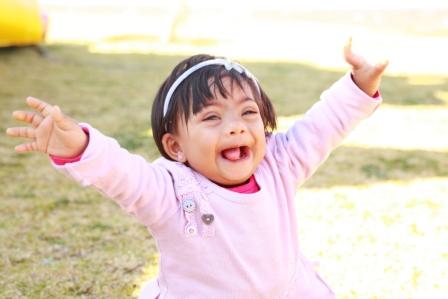The day the gynaecologist told us that there was a 100% chance that our unborn baby girl had Down Syndrome, was one of the most devastating of our lives. I cried all the way from her practice rooms back to work.
If I knew then what I know now, I would have been jumping for joy for being given the honour to raise such an incredible human being.
Defining Down Syndrome
Down Syndrome is a chromosomal disorder caused by an error in cell division that results in an extra 21st chromosome.
The syndrome leads to impairments in both cognitive ability and physical growth that range from mild to moderate developmental disabilities.
That’s all it is. An extra chromosome.
Dhiya’s birth story
Our little Dhiya was born with two holes in her heart and a dilated heart chamber. She spent the first four weeks of her life at the Park Lane Neonatal ICU learning to breathe and suck. Some of the nurses didn’t think she would leave soon, but kind Sister Pat insisted that we try breastfeeding and within four days of starting, she was discharged.
There are various myths about Down Syndrome, and since having Dhiya, I can say they are not true…
Myth one: Babies with Down Syndrome cannot breastfeed
Truth: Babies with Down Syndrome can breastfeed, and do so successfully, despite their enlarged tongues. It benefits them as it would any other baby in terms of general health and improvement in cognitive ability.
Myth two: Children with Down Syndrome must be placed in a special school
Truth: Children with Down Syndrome participate fully in public and private educational programmes. There are in fact cases of Down Syndrome children excelling in many areas, such as mathematics and reading.
It is the inclusivity that is the biggest advantage to their development. At 15 months, Dhiya loved nothing more than her daily reading sessions.
Myth three: Children with Down Syndrome are always happy
Truth: These children experience a full range of emotions, just like everyone else. They respond positively to kindness and friendship and feel hurt and pain just like you and I do.
Myth four: Having a sibling with Down Syndrome will be a hardship for a ‘normal’ child
Truth: Most families report that their ‘normal’ children are more compassionate and tolerant of people because of their experience of having a sibling with Down Syndrome. The sibling relationship is generally a typical or normal one – full of love, occasional arguments, and togetherness.
What is a ‘normal’ child anyway?
Is it crawling at 11 months? Then Dhiya has done that. Is it saying ‘dada’ or ‘mama’ at the age of eight months? Then Dhiya has done that. Is it being madly in love with your two smelly brothers? Well, Dhiya is crazy about hers.
The only special needs a Down Syndrome child has, is to be loved and cared for, just like everyone else
Latest posts by Contributor (see all)
- Video: Food allergies can cause your baby to be restless - June 27, 2014
- Boost your baby’s language skills with reading - June 27, 2014
- Top tips for your baby’s bedtime routine - June 27, 2014
-
No Comments" href="https://all4baby.co.za/uncategorized/476/essential-vitamins-minerals-pregnancy/">

Stock up on these vitamin rich foods during pregnancy
-
No Comments" href="https://all4baby.co.za/newborns-0-6-months/birth-defects/454/congenital-heart-defects-every-mom-mom-know/">

Congenital heart defects: What every mom and mom-to-be should know
-
No Comments" href="https://all4baby.co.za/pregnancy/work-maternity/209/tips-working-pregnant-girl/">

Tips for the working pregnant girl
-
No Comments" href="https://all4baby.co.za/birth/types-of-birth/199/insure-baby-life-threatening-diseases/">

Insure your baby against life threatening diseases


 Saving...
Saving...